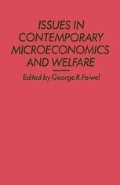Abstract
It is part of received doctrine among specialists in the theory of international trade that unilateral transfers harm the donor country and benefit the recipient. In sharp contrast to that doctrine, it has been asserted by specialists in the theory of economic development that, frequently, foreign aid does more harm than good in the recipient country and operates to the advantage of exporters in the donor country.
The views expressed in this chapter are not necessarily those of the United Nations.
Access this chapter
Tax calculation will be finalised at checkout
Purchases are for personal use only
Preview
Unable to display preview. Download preview PDF.
References
Bauer, P. T. (1971) Dissent on Development Studies and Debates in Developmental Economics, London: Weidenfeld & Nicolson.
Bhagwati, J. N., R. A. Brecher and T. Hatta (1982) ‘The Generalized Theory of Transfers and Welfare’ Columbia University, mimeo
Brecher, R. A., and J. N. Bhagwati (1981) ‘Foreign Ownership and the Theory of Trade and Welfare’, Journal of Political Economy, 89: 497–511.
Brecher, R. A., and J. N. Bhagwati (1982) ‘Immiserizing Transfers from Abroad’. Journal of International Economics, 13: 353–64.
Gale, D. (1974) ‘Exchange Equilibrium and Coalitions: An Example,’ Journal of Mathematical Economics, 1: 63–6.
Guesnerie, R., and J. -J. Laffont (1978) ‘Advantageous Reallocations of Initial Resources’, Econometrica, 46: 835–41.
Kemp, M. C., and S. Kojima (1982) ‘Tied Aid and the Paradoxes of Donor-enrichment and Recipient-impoverishment’, University of New South Wales, mimeo.
Hatta, T. (1973), ‘Compensation Rules in Multiple-consumer Economies’, Johns Hopkins University, mimeo.
Léonard, D., and R. Manning (1982) ‘Advantageous Reallocations: A Constructive Example’, University of New South Wales, mimeo.
Mosley, P. (1980) ‘Aid, Savings and Growth Revisited’, Oxford Bulletin of Economics and Statistics, 42: 79–95.
Ohyama, M. (1972) ‘Trade and Welfare in General Equilibrium’, Keio Economic Studies, 9: 37–73.
Papanek, G. F. (1973) ‘Aid, Foreign Private Investment, Savings and Growth in Less Developed Countries’, Journal of Political Economy, 81: 120–30.
Samuelson, P. A. (1947) Foundations of Economic Analysis, Cambridge, Mass. Harvard University Press.
Yano, M. (1982) ‘Welfare Aspects of the Transfer Problem: on the Validity of the “New-orthodox” Presumptions’, Cornell University, mimeo.
Editor information
Editors and Affiliations
Copyright information
© 1985 George R. Feiwel
About this chapter
Cite this chapter
Kemp, M.C., Kojima, S. (1985). The Welfare Economics of Foreign Aid. In: Feiwel, G.R. (eds) Issues in Contemporary Microeconomics and Welfare. Palgrave Macmillan, London. https://doi.org/10.1007/978-1-349-06876-0_15
Download citation
DOI: https://doi.org/10.1007/978-1-349-06876-0_15
Publisher Name: Palgrave Macmillan, London
Print ISBN: 978-1-349-06878-4
Online ISBN: 978-1-349-06876-0
eBook Packages: Palgrave Economics & Finance CollectionEconomics and Finance (R0)

